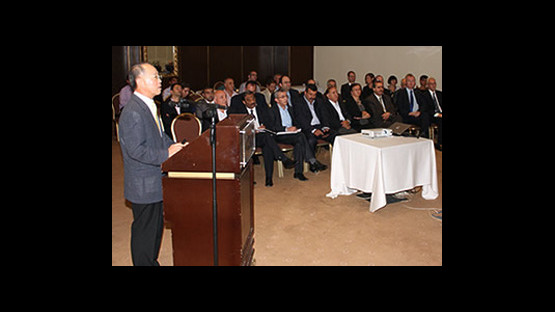An IAEA-led team of international experts who reviewed Jordan's programme for introducing nuclear power found that notable progress has been made in the development of the country's nuclear infrastructure. They recognized a few good practices, such as agreeing on pre-investment activities with the strategic partner, using graduate students for outreach to Jordan's youth population, and establishing a localization committee with wide participation from national industry.
The team, assembled at Jordan's request by the IAEA, conducted an Integrated Nuclear Infrastructure Review (INIR) mission in Jordan from 4 to 14 August 2014.
"The INIR mission will greatly assist Jordan in developing its nuclear power programme in line with the IAEA recommendations," said Dr. Khalid Toukan, Chairman of the Jordan Atomic Energy Commission. "Nuclear power will be an important contribution to alleviating our major energy challenges in the future."
INIR missions are designed to assist IAEA Member States to assess the status of the national infrastructure needed for introducing nuclear power. The INIR mission team consists of IAEA staff and international experts. By providing a comprehensive review of all facets of a nuclear power programme, spanning the regulatory body, utility and all relevant Government stakeholders involved, INIR is a valuable tool for promoting transparency and openness and confirming that the necessary infrastructure is being developed in an integrated way.
Recommendations
"Jordan was the first country to invite an INIR mission in 2009, and in this second mission, we have seen that our counterparts have made notable progress in developing the nuclear infrastructure in Jordan," said Jong Kyun Park, INIR mission team leader and Director of the IAEA Division of Nuclear Power. "We had extensive discussions on a wide range of issues and gained a deeper understanding of Jordan's programme during the mission."
The recommendations made by the INIR team included finalizing national policies and government commitment, improving coordination between the various Ministries, strengthening the legislative framework, and finalizing pre-investment activities.
Jordan decided to include nuclear power in its energy mix to ensure security of energy supply, reduce a large and growing reliance on energy imports (90%) and to meet future increase in energy demand. The country plans to build a 2 x 1000 MWe nuclear power plant (NPP) at the Amra site, about 70 km east of Amman, in cooperation with the Russian Federation, which will also make a significant investment in the nuclear power plant.
Jordan and the IAEA have a long-standing cooperation. Jordan hosted the first ever INIR mission in August 2009, when the country was at the final stage of making a decision on establishing a nuclear power programme.
In all, eight Jordanian organizations involved in building the national nuclear infrastructure participated in the discussions with the INIR mission team, including the Jordan Atomic Energy Commission, the Ministry of Energy and Mineral Resources, the Energy and Minerals Regulatory Commission and the National Electric Power Company.
The IAEA has developed guidelines and milestones to help countries work in a systematic way towards the introduction of nuclear power and ensure that the infrastructure required for the safe, responsible and sustainable use of nuclear technology is developed and implemented. The IAEA Milestones approach is documented in the IAEA publication Milestones in the Development of a National Infrastructure for Nuclear Power (IAEA Nuclear Energy Series No. NG-G-3.1).
This is the 13th INIR mission organized by the IAEA. It was implemented under a national IAEA technical cooperation project (JOR2009). Other embarking countries that have benefited from this service include Bangladesh, Belarus, Indonesia, Poland, Thailand, Turkey, the United Arab Emirates and Viet Nam. In 2013, South Africa hosted the first INIR mission to an operating country considering expanding its nuclear power programme.


